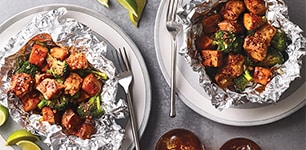Published October 1, 2021
Our immune system is complex and influenced by many factors—not just foods or nutrients. The claims are everywhere, but is immunity something you can really boost? During the flu season or times of illness, people often seek special foods or vitamin supplements, such as vitamin C, citrus fruits, chicken soup, and tea with honey, to boost immunity. Do they all work? Our dietitians are here to help you sort fact from fiction.

A brief overview of the immune system.
The overall function of the immune system is to prevent or limit infection. We are constantly exposed to potentially harmful microbes. Our immune system, a network of intricate pathways in the body, protects us against these harmful microbes as well as certain diseases. It recognizes foreign invaders like bacteria, viruses, and parasites, and takes immediate action. There are two types of immunity: innate and adaptive.
- Innate immunity is a first-line defense from pathogens that try to enter our bodies. For example, skin is a protective barrier that keeps out most pathogens.
- Adaptive or acquired immunity is a system that learns to recognize a pathogen. When a foreign substance enters the body, these cells and organs create antibodies and lead to multiplication of immune cells (including different types of white blood cells) that are specific to that harmful substance, and attack and destroy it. Our immune system then adapts by remembering the foreign substance so that if it enters again, these antibodies and cells are even more efficient and quick to destroy it.1
Now that you know a little more about how the immune system works, you can see why claims about immunity-boosting foods and supplements are not accurate. The idea that foods boost immunity is enticing, but the immune system is complex and requires balance and harmony. There is still much that researchers don't know about the intricacies and interconnectedness of the immune response.
Even though our immune system is complicated, there are lifestyle habits that may help maintain and support your overall health as well as your immune system.
Ten steps to support your overall health and immune system.
- Maintain a healthy weight and focus on consistent practice of lifestyle habits. This includes a balanced diet and exercise. Obesity may weaken immune function, so managing your weight is important.2
- Balance your diet. While certain nutrients—including vitamin E, vitamin D, zinc, selenium, iron, and protein—are needed for the growth and function of immune cells, you can’t just focus on these nutrients only because they work together with other nutrients in the body.3
- Start with a Mediterranean diet.
- Try our Smoky Chicken and Vegetables recipe for a balanced meal.
- Include plant-based sources of protein.
- Try our Roasted Sweet Potato Butternut and Groundnut Soup featuring plant-based sources of protein: chickpeas, peanuts, and peanut butter.
- Limit added sugars as much as possible, especially with beverages. Here are some ways to rethink your drink.
- Supplements can fill in the gaps. Vitamins and minerals that provide the recommended daily allowances (RDA) may be helpful, but are not substitutes for a balanced diet. In terms of other supplements that make immunity claims—buyer beware. Popular supplements, including omega 3s,4 probiotics,5 elderberry,6 echinacea, and garlic,7 are touted as having immune system benefits, but research is still developing. In some cases, supplements could be harmful if you take too many. Always consult your physician before adding a supplement to your regimen.
Don’t replace facts with fiction when supporting your immune system.
FACT FICTION Balanced diet Immunity juice shots All forms of exercise Only doing yoga Rest Running on less sleep Vaccines Mega doses of Vitamin-C supplements Quitting smoking Vaping Limiting alcohol Caffeinated drinks - Practice food safety. Avoid foodborne illnesses with these steps.
- Clean: Wash hands and surfaces often. Always wash hands with soap and warm water for 20 seconds before and after handling food.
- Separate: Don’t cross-contaminate. Keep raw meat, poultry, fish, and their juices away from other food. After cutting raw meats, wash cutting board, knife, and countertops with hot, soapy water.
- Cook: Make sure that meat and seafood are cooked to proper temperatures using a food thermometer.
- Chill: Refrigerate promptly, and always refrigerate perishable food within 2 hours of serving (1 hour when the outside temperature is above 90°F).8
- Exercise. It can prevent weight gain and help you sleep.9 Aim for at least 30 minutes of physical activity 5 days a week.10
- Sleep on it. Here’s how you can develop a consistent sleep schedule.
- Relax. This is easier said than done, but try to manage stress. Try exercise, meditation, a hobby, or quality time with a trusted friend or family member.11
- Quit smoking. Learn how to quit.
- Less or no alcohol. Moderate alcohol consumption means an average of one to two drinks per day for men and one drink per day for women. In general, a drink is one 12-ounce regular beer, 5 ounces of wine, or 1.5 ounces of 80-proof spirits (such as bourbon, vodka, or gin). Avoid binge drinking (more than 4 drinks on one occasion).12
- Get vaccinated. Get a flu shot if it’s recommended by your doctor or healthcare professional. Flu shots and other vaccines are available at your local Publix Pharmacy.13
With nutrition, it’s the overall eating pattern that matters versus a single food or nutrient. Eating enough nutrients as part of a balanced diet is required for the health and function of all cells, including immune cells. Eat a balanced diet with whole fruits (citrus, berries); vegetables (broccoli, carrots); low-fat dairy (yogurt); lean proteins (lean beef, chicken); whole grains; and plenty of water.
For the love of you.
Choosing how you eat is uniquely personal. It’s about your needs, your preferences, and your goals. As your wellness ally, we’re in your corner with fresh ideas, recipes, and wellness icons that make it easier to shift toward wiser food choices. It’s all about you, at your very best.
Sources
1 Nutrition and immunity. Harvard T.H. Chan School of Publix Health. September 6, 2021.
2 Obesity, inflammation, and the immune system. National Library of Medicine. March 20, 2012.
3 Nutrition and immunity. Harvard T.H. Chan School of Publix Health. September 6, 2021.
4 Omega-3 fatty acids. National Institutes of Health. September 6, 2021.
5 Probiotics. National Institutes of Health. September 6, 2021.
6 Elderberry. National Center for Complementary and Integrative Health. September 6, 2021.
7 Nutrition and immunity. Harvard T.H. Chan School of Publix Health. September 6, 2021.
8 Keep food safe! Food safety basics. Food Safety and Inspection Service. December 20, 2016.
9 Physical activity: Why it matters. Centers for Disease Control and Prevention. May 13, 2020.
10 Physical activity for different groups. Centers for Disease Control and Prevention. July 29, 2020.
11 Stress and health. Harvard T.H. Chan School of Publix Health. September 6, 2021.
12 Is drinking alcohol part of a healthy lifestyle? American Heart Association. December 30, 2019.
13 Seasonal flu vaccines. Centers for Disease Control and Prevention. August 26, 2021.

 You are about to leave publix.com and enter the Instacart site that they operate and control. Publix’s delivery and curbside pickup item prices are higher than item prices in physical store locations. Prices are based on data collected in store and are subject to delays and errors. Fees, tips & taxes may apply. Subject to terms & availability. Publix Liquors orders cannot be combined with grocery delivery. Drink Responsibly. Be 21. For prescription delivery, log in to your pharmacy account by using the Publix Pharmacy app or visiting
You are about to leave publix.com and enter the Instacart site that they operate and control. Publix’s delivery and curbside pickup item prices are higher than item prices in physical store locations. Prices are based on data collected in store and are subject to delays and errors. Fees, tips & taxes may apply. Subject to terms & availability. Publix Liquors orders cannot be combined with grocery delivery. Drink Responsibly. Be 21. For prescription delivery, log in to your pharmacy account by using the Publix Pharmacy app or visiting 
